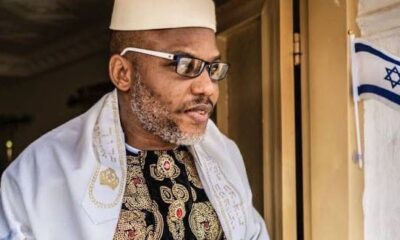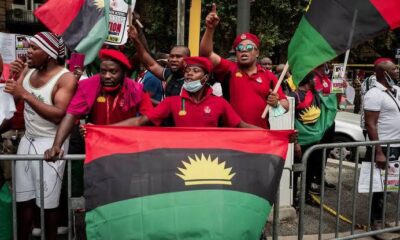Politics
Nnamdi Kanu Should Not Have Been Arrested, Jailed; Peter Obi Speaks Strongly Against Conviction
Peter Obi has criticised the Federal Government over the conviction of IPOB leader Nnamdi Kanu, arguing that the separatist agitator should never have been arrested and that dialogue.

- Peter Obi has criticised the Federal Government over the conviction of IPOB leader Nnamdi Kanu, arguing that the separatist agitator should never have been arrested and that dialogue—not coercion—remains the path to lasting peace in Nigeria.
Peter Obi, former Governor of Anambra State and the Labour Party’s 2023 presidential candidate, has condemned the conviction of Nnamdi Kanu, leader of the Indigenous People of Biafra (IPOB), insisting that the government mishandled the case from the onset.
In a statement issued on Saturday, Obi said Kanu’s arrest, trial, and eventual conviction on terrorism-related charges represented a failure of leadership and a refusal to address legitimate grievances through peaceful means.
“I have always maintained that Mazi Kanu should never have been arrested. His arrest, detention, and now conviction represent a failure of leadership and a misunderstanding of the issues at stake,” Obi stated.

According to him, many of the concerns raised by Kanu were neither new nor impossible to resolve.
“The concerns Kanu raised were not unheard of. The issues for which he demanded solutions were not insoluble. It only required wisdom, empathy, and a willingness to listen,” he said. “In any functional society, such grievances are met with dialogue and reforms aimed at strengthening unity.”
Obi reiterated that dialogue, constructive engagement, and inclusive governance—not coercion—were the true path to peace.
“Coercion becomes necessary only when reason has been exhausted. In this case, I submit that reason was not only not exhausted, but was probably not explored at all, or not fully explored,” he said.
His reaction came two days after the Federal High Court in Abuja sentenced Kanu to life imprisonment, convicting him of terrorism, incitement, and calls for violent attacks on security operatives. Justice James Omotosho, who delivered the judgment, cited several instances where Kanu allegedly encouraged bloodshed and separatist violence.
Beyond the legal outcome, Obi said the conviction should compel Nigerians to reflect deeply, especially at a time when the country is battling severe economic hardship, insecurity, and the effects of poor governance. He warned that the development may escalate tensions rather than ease them.
DON’T MISS: Heavy Security at Sokoto Prison as Nnamdi Kanu Arrives After Life Sentence
He argued that the government’s approach had deepened mistrust and created an avoidable distraction at a time when citizens are overwhelmed by inflation and insecurity. While some may insist that “the law has taken its course,” he stressed that leadership requires more than rigid application of laws.
“Nations around the world resort to political solutions, negotiated settlements, and even amnesty when legal processes alone cannot serve the broader interest of peace and stability. Nigeria is not an exception,” he said.
Obi likened the government’s handling of the matter to “a man trapped in a hole who keeps digging deeper,” warning that such decisions worsen the nation’s overall condition.

Calling for calm and renewed national unity, he urged leaders to embrace reconciliation over retaliation.
“If we truly desire a united, peaceful, and progressive Nigeria, our leaders must choose healing over hostility, reconciliation over retaliation, and dialogue over division,” he said.
He concluded with an appeal for senior national figures—including the Presidency, the Council of State, and respected statesmen—to intervene and work toward a lasting political solution.
“My ultimate call is for us to be optimistic for peace and reconciliation. Credible statesmen who love this country and value cohesion must rise to the occasion for a lasting solution,” he said.























